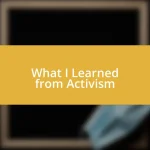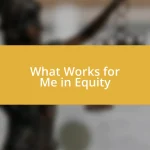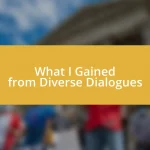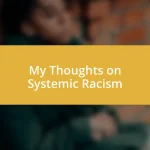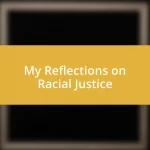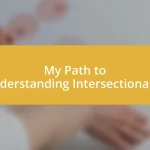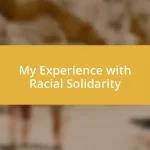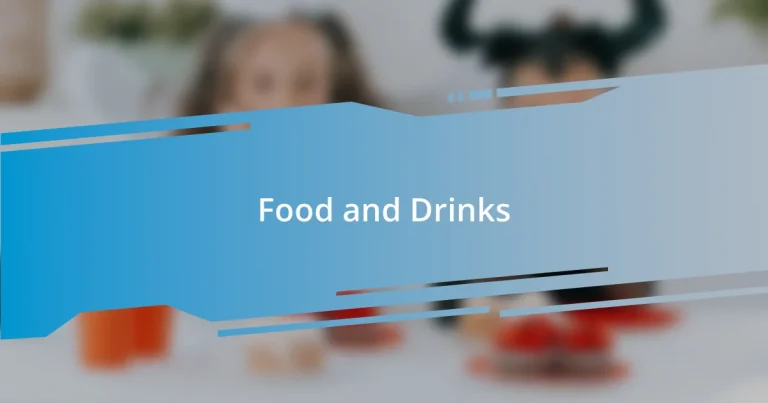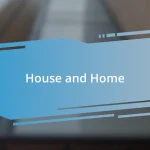Key takeaways:
- Ableism creates emotional scars and social isolation, impacting confidence and self-worth, as individuals often feel judged based on their disabilities.
- Building a supportive network and engaging in community activism empower individuals to navigate ableism, fostering shared experiences and collective strength.
- Practicing self-advocacy and developing coping strategies, such as mindfulness and preparation for difficult conversations, help individuals reclaim their voice and create change.
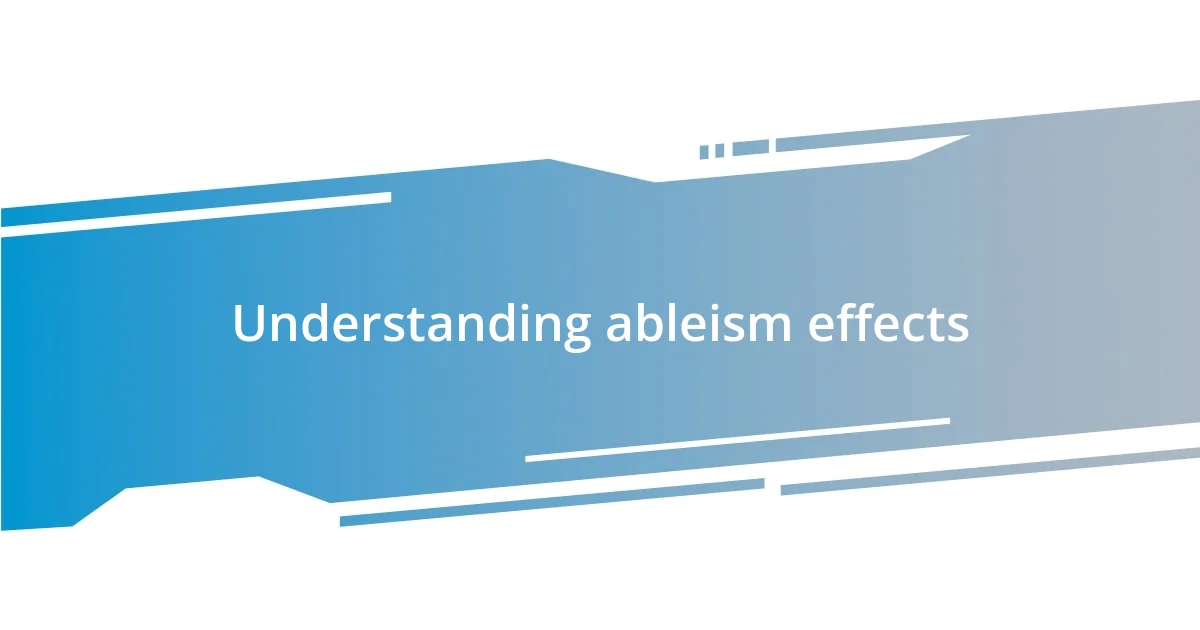
Understanding ableism effects
Ableism affects individuals in profound ways, often leaving emotional scars that run deep. I remember a moment at my workplace when a colleague dismissed my ideas simply because of my disability. The frustration I felt wasn’t just about being overlooked; it was a painful reminder of how pervasive ableism can be, subtly undermining confidence and self-worth.
One of the most striking effects of ableism is the social isolation it can create. Have you ever felt like you were on the outside looking in? I have. There were times when I turned down invitations to social events because I feared judgment or exclusion due to my different abilities. This withdrawal isn’t merely a personal choice; it reflects a broader societal misconception that those with disabilities don’t belong in certain spaces.
Additionally, ableism can desensitize us to the struggles of others. I’ve witnessed friends shrug off the challenges faced by disabled individuals, thinking they’re exaggerated or unimportant. This indifference can be disheartening, as it not only perpetuates stereotypes but also diminishes our collective capacity for empathy and understanding. What would happen if we actively chose to challenge these perceptions instead?
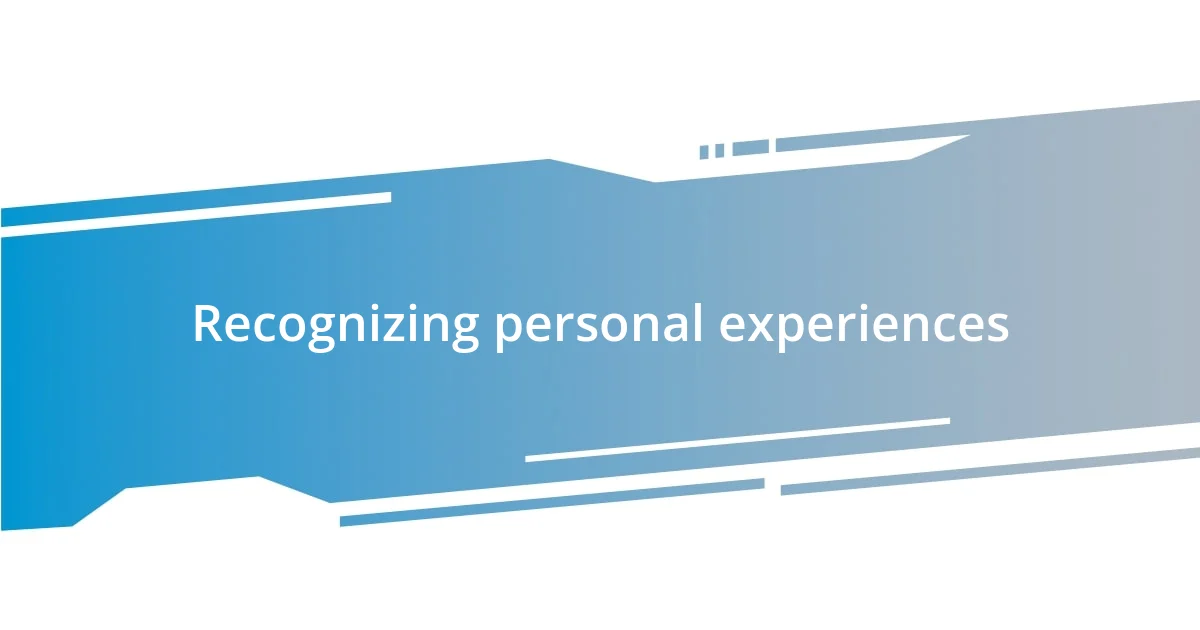
Recognizing personal experiences
Recognizing personal experiences with ableism isn’t always straightforward, but it often begins with moments that challenge our understanding of ourselves. I vividly recall a time during a group project in college when my input was overshadowed. It felt like I was shouting into a void; my insights were lost amid assumptions about my capabilities simply because I walked with a cane. That experience not only stung but also made me more aware of how differently people perceive my worth based on surface-level judgments.
- I remember feeling a pang of loneliness when my disability caused friends to avoid discussing certain topics, thinking they might upset me.
- Another experience was when I overheard someone saying, “They must struggle to keep up,” as if my participation mattered less because of my physical limitations.
- Even the smallest gestures, like someone offering their arm to “help” me, can make me feel like a child needing assistance rather than a capable adult.
- These moments, painful as they may be, push me to confront and navigate the complexities of ableism in everyday life.
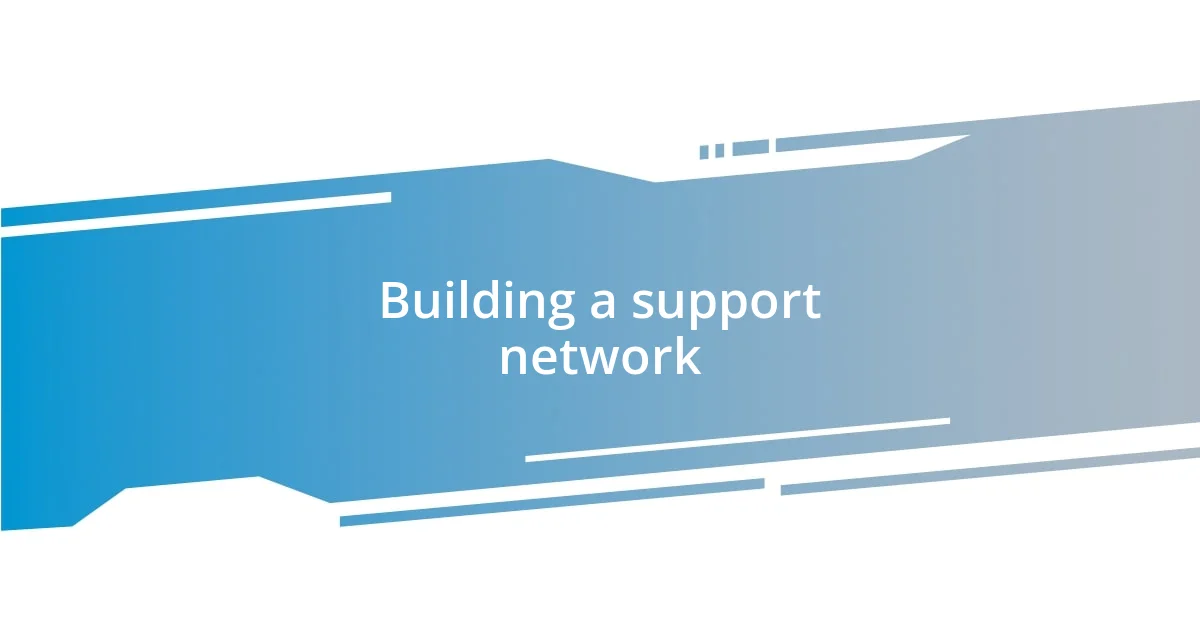
Building a support network
Building a support network can be one of the most empowering steps in navigating the challenges of ableism. I’ve found that surrounding myself with understanding friends and allies has drastically changed my experience. Having someone who truly listens and validates my feelings can make difficult days a bit lighter, reminding me that I am not alone on this journey.
Creating connections with others who understand these challenges offers a unique perspective. For instance, when I attended a local support group, I realized how shared experiences could transform feelings of isolation into a sense of belonging. Listening to others’ stories, I felt a familiar resonance that reminded me of my own struggles and triumphs, reinforcing the importance of building that network.
It’s worth noting that support doesn’t have to come solely from those who share similar experiences. Sometimes, allies who are simply willing to learn and engage can make a huge difference. I remember a friend who took the time to read about ableism and ask questions to better understand my perspective. That genuine curiosity fostered a deeper connection between us, allowing me to share my experiences more openly.
| Support Network Type | Benefits |
|---|---|
| Friends and Family | Emotional support and understanding, familiarity with personal experiences |
| Support Groups | Shared experiences, sense of belonging, practical advice |
| Allies | Broader understanding, advocacy, external perspective |
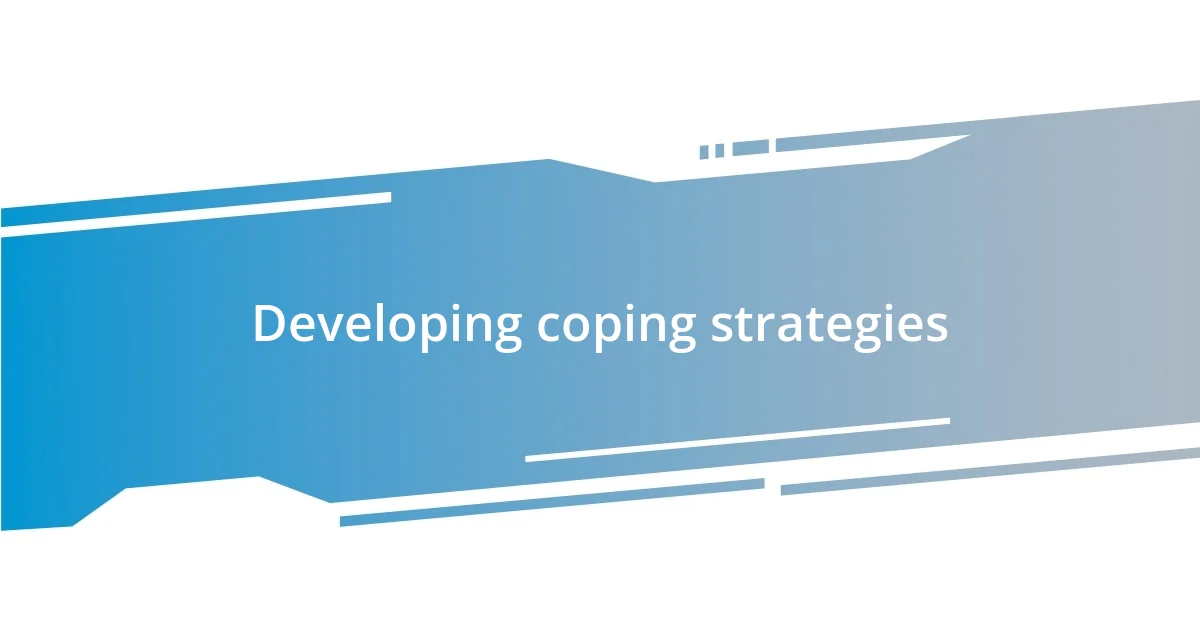
Developing coping strategies
Developing coping strategies can often feel like piecing together a puzzle with missing pieces. One method that has worked for me is engaging in mindfulness practices, like meditation or journaling. I recall sitting quietly one afternoon, reflecting on my emotions after a particularly frustrating encounter with ableism. That moment of pause helped me understand my feelings, turning anger into a motivation to advocate for myself.
I’ve also found that setting clear boundaries is essential in dealing with ableism. There was a time when a colleague’s offhand comment about my abilities caught me off guard. Instead of letting it simmer inside me, I chose to speak up, stating calmly how their words affected me. This not only empowered me but also opened a dialogue about respect and understanding within our team. Have you ever felt the weight of unspoken words? I believe expressing my thoughts alleviates that pressure on my shoulders.
Embracing humor has surprisingly become another crucial strategy for me. I remember a time when a friend clumsily tried to assist me while I was managing my mobility device. Instead of feeling embarrassed, I joked about how I was my own personal roadblock! Laughter diffuses tension and reminds me that while ableism can be discouraging, it doesn’t have to steal my joy or confidence. Finding these moments of lightness fosters resilience and creativity in how I tackle these adversity-filled encounters.
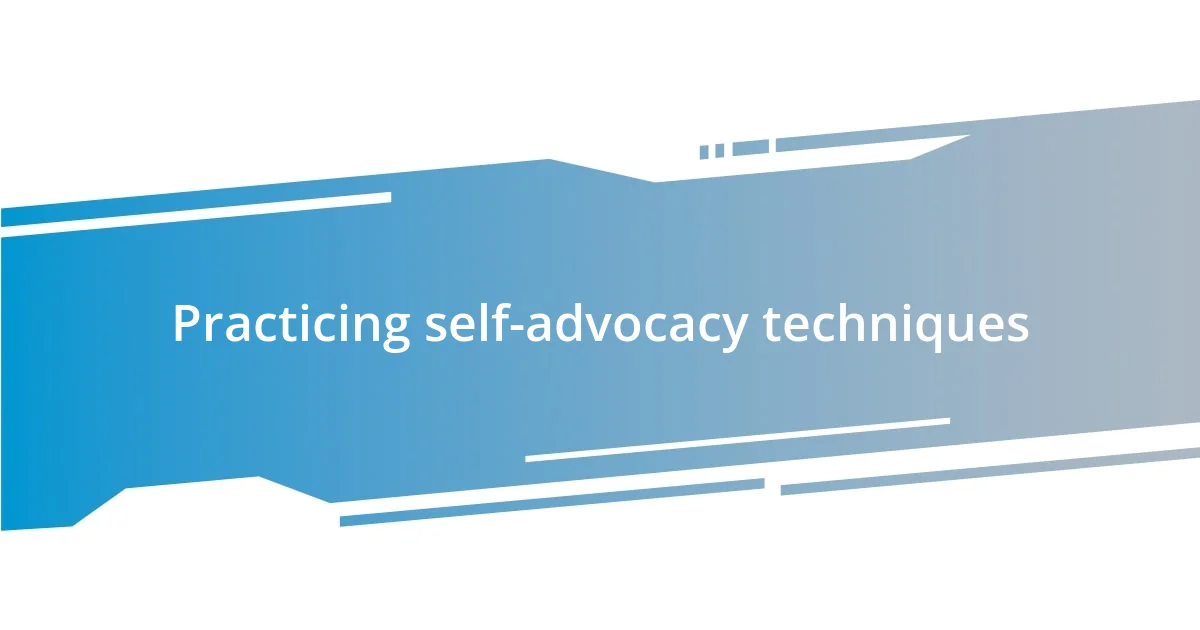
Practicing self-advocacy techniques
Practicing self-advocacy techniques has been a game-changer for me. Whenever I feel overwhelmed by ableism, I remind myself of my rights and the importance of speaking up. I recall an experience at a public event where the venue was inaccessible. Rather than letting my frustration simmer, I approached the organizers to address the issue directly. To my surprise, they were receptive and eager to find a solution. That moment reinforced my belief that advocating for myself not only brings awareness but also drives change.
I often use clear and direct language when expressing my needs. When I was challenged by a healthcare provider who didn’t understand my condition, I calmly explained the specifics of my situation—citing my experiences and the research I had done. I could see the shift in their demeanor as I detailed how their assumptions were affecting my care. Have you ever felt empowered simply by articulating your truth? That clarity fosters confidence, creating an environment where meaningful conversations can take place.
Another technique that helps me is role-playing difficult conversations with a trusted friend before they happen. When I anticipated a meeting regarding workplace accommodations, I practiced how to present my case. This preparation not only alleviated my anxiety but also allowed me to approach the discussion with a sense of authority. I’ve learned that when I’m well-prepared, I can navigate challenges with conviction. It’s like having a safety net beneath me, ready to catch me if the conversation takes an unexpected turn.
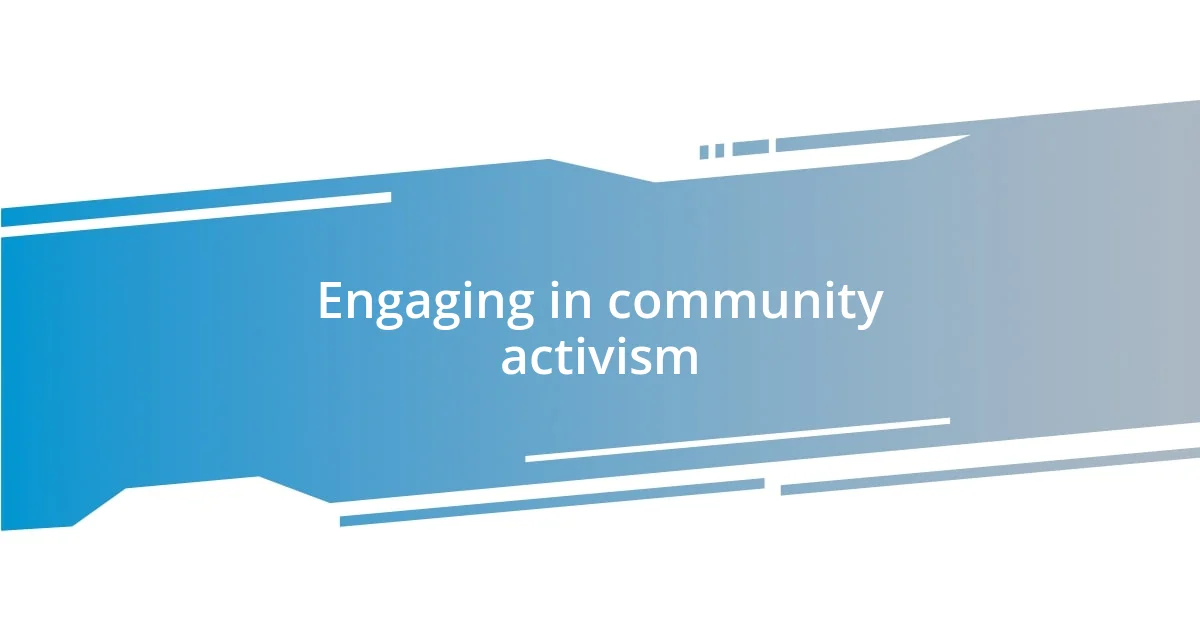
Engaging in community activism
Engaging in community activism has brightened my path in navigating ableism. I remember a local rally focused on disability rights, where I decided to share my experiences. Facing a crowd felt daunting, yet that moment transformed my anxiety into empowerment. It was incredible to see others nodding in understanding as I spoke. Have you ever felt that connection with a group that ignites a fire within you? Activism can do that, creating a shared sense of purpose.
Joining a local advocacy group has been another fulfilling aspect of my activism journey. One particular initiative involved organizing workshops on accessibility in public spaces. Each meeting was a blend of brainstorming and camaraderie, where we shared insights and solutions. I vividly recall a session where we mapped out a strategy to approach local business owners about creating accessible entrances. The enthusiasm in the room was contagious, reminding me that collective efforts amplify our voices. It’s about building a community that advocates for itself—a network of support.
Sometimes, advocating feels like an uphill battle, especially when met with resistance. I participated in a petition drive against a public policy that overlooked disabled voices. Facing rejection from officials can be disheartening, but sharing those challenges with fellow activists reinforced our resolve. Have you ever felt the weight of disappointment yet found strength in togetherness? It’s in those moments I learned that community activism isn’t just about the outcome; it’s about connecting, sharing stories, and lifting each other up in the fight against ableism.
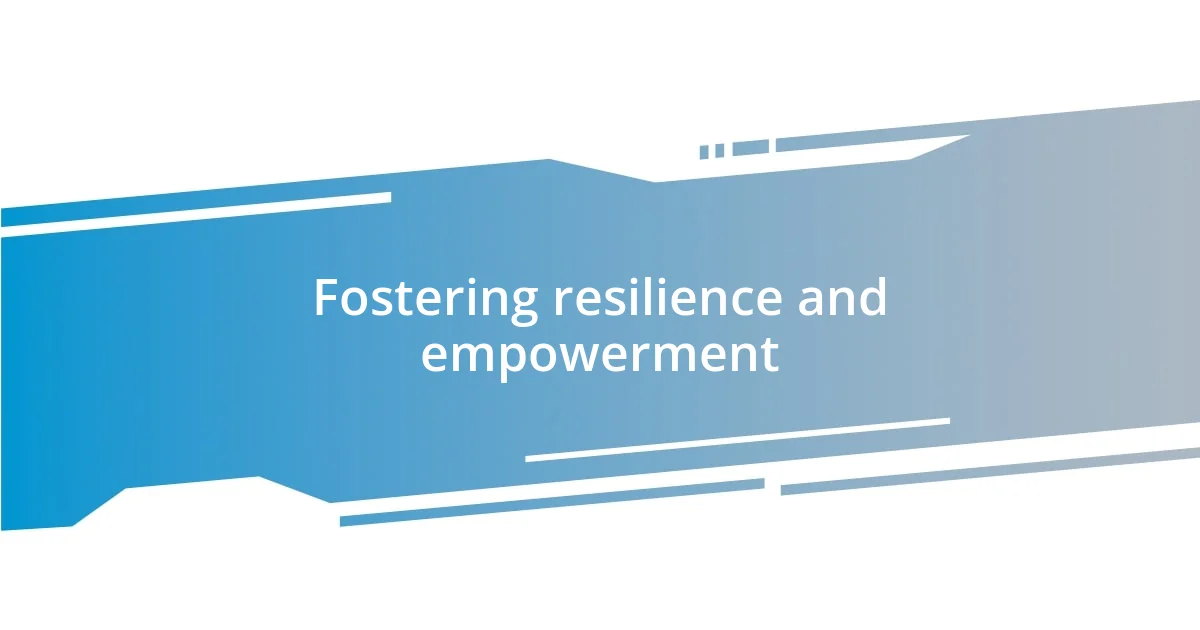
Fostering resilience and empowerment
Fostering resilience and empowerment often requires leaning into our unique strengths. I remember a particularly tough day when every minor interaction felt like an uphill battle against ableist attitudes. Instead of letting my frustration dictate my mood, I took a moment to recall past victories—moments when I successfully stood my ground. This reflection acted like a mental shield, allowing me to regain my composure and embrace the day with renewed determination. Have you ever found strength in your past experiences? I believe that tapping into our personal narratives helps us reframe challenges as opportunities for growth.
Building a network of supportive relationships can amplify our resilience. I once joined a writing group focused on sharing personal stories related to disability. The first time I shared my challenges, I felt exposed, but the warm reactions and shared experiences created an immediate sense of belonging. It was a reminder that we are not alone in this journey. Have you ever experienced that cozy warmth from being surrounded by people who truly understand? Those connections not only empower us but also help reinforce our sense of identity and worth, reminding us that we are valid and deserving of respect.
Engaging in collaborative projects also strengthens our collective empowerment. I participated in a community art initiative where we created a mural highlighting disability pride. The process was incredibly healing; as I painted alongside others, we shared stories, laughter, and even frustrations. This collaboration turned a simple art project into a thriving space for dialogue about ableism. Have you ever felt the rush of creativity coinciding with activism? It’s transformative to witness how fostering collaboration can shift perceptions and ignite empowerment not only within ourselves but also in the broader community.
